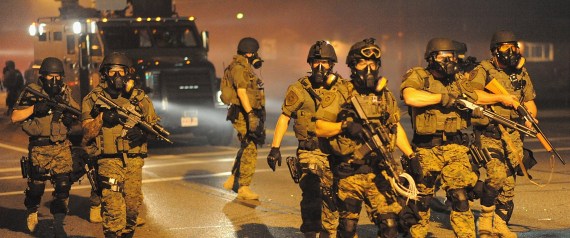
“Michael Brown doesn’t want to be remembered for a riot,” the Rev. Al Sharpton said at the shooting victim’s funeral. “He wants to be remembered as the one who made America deal with how we police in the United States.” Two decades ago Rodney King wanted to be remembered for the same thing. As the Justice Department and the Senate now launch investigations prompted by the tactics of the Ferguson, Missouri, police in Brown’s shooting and its aftermath, we would do well to remember the lessons that the 1991 Christopher Commission drew from its investigation into the police practices that led to King’s beating at the hands of the LAPD and the riots that followed. Indeed, if the nation had indeed applied the recommendations of the Christopher Commission, there might have been no need for the National Guard and Attorney General Eric Holder to go to Ferguson to quell another potential riot.
Among the central findings of the Christopher Commission were that attitudes on gender as well as on race contributed to poor policing practices. According to the Commission, “female LAPD officers are involved in excessive use of force at rates substantially below those of male officers.” The Commission credited this to the female officers’ perceived ability to be “more communicative, more skillful at deescalating potentially violent situations and less confrontational … less personally challenged by defiant suspects and [showing] less need to deal with defiance with immediate force or confrontational language.”
Notwithstanding their performance, LAPD Chief Darryl Gates admitted to the Christopher Commission that female officers “had a ‘real tough time’ achieving acceptance within the Department,” with colleagues’ complaints focused on a perceived lack of stereotypically masculine qualities. According to the Christopher Commission, the police systematically overvalued these masculine qualities. The Commission criticized specific “macho” tactics of the police and police-academy training that overemphasized the paramilitary and physical and underemphasized interpersonal skills, sensitivity, politeness, and the ability to communicate, all skills that male as well as female cops could use effectively.
In 1993 the Women’s Advisory Council to the LAPD followed up with a “Blueprint” calling straight down the line for less masculine and more feminine criteria in hiring and evaluating police, with the assumption that using them would both increase the number of women on the force and improve overall police performance. Instead of seeking to hire people who are aggressive, the Blueprint said, what the police should seek are good communicators; instead of concentrating on recruiting from the armed forces, they should recruit from among social workers and school teachers.
Unfortunately, the war on terror took its toll on the use of effective policing methods perceived to be feminine, not only in the Middle East but in the domestic-policing context as well. As Penny Harrington, the first female police chief of Portland, Oregon, told journalist Susan Faludi in 2005, law-enforcement agencies shifted funds “from community policing — where many female police officers had distinguished themselves — to all-male ‘counter-terrorist squads’ stocked with absurd amounts of firepower financed by the Department of Homeland Security.”
But shock-and-awe tactics worked no better in Los Angeles and Ferguson than in Iraq and Afghanistan. Just as harsh methods of interrogation, although overvalued for their macho character, have a worse track record of obtaining actionable intelligence than gentler ones, so community policing has been more effective than displays of force, not only in defusing riots and resistance but in eliminating the police actions that provoke a community to riot. Thus, in Los Angeles, where more of the Christopher Commission’s recommendations took hold, the shooting of an unarmed black man two days after Michael Brown was shot in Ferguson led not to riots met with riot gear and tear gas but to peaceful protests monitored by Polo-shirt wearing, bike-riding cops, and to police outreach to community leaders, building on what the LAPD called a “bank of trust.”
The rest of the country needs to relearn the lessons of the Christopher Commission.















